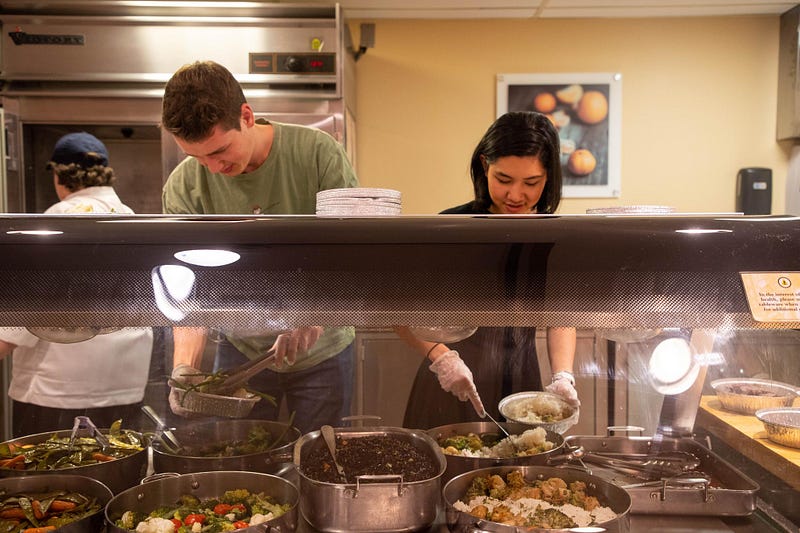
Photo Courtesy of Hamilton College/Katherine O’Malley ‘19
Hamilton College’s Food Harvest program was created five years ago by student Sam Carletta ’17 and Professor of Economics Paul Hagstrom. Its goal is to combat the rising food insecurity issue in the Utica community as well as to tackle the problem of wasted food on Hamilton’s campus. The program has been spearheaded by Amy James, Director of the Community Outreach and Opportunity Project (COOP), and harvests lunch and dinner in McEwen and Commons nearly everyday.
Student volunteers, who sign up to package uneaten food in the dining halls, run the program. These volunteers work alongside coordinators, who take on extended responsibilities such as weekly guaranteed food salvaging.
The Food Harvest program’s process of salvaging food is efficient and takes 15to20minutesonaverage.Eachday, volunteers go behind the food service counters and speak to Bon Appetit staff, who then direct them to tins that can be used to package food. Volunteers scoop food into these tins and leave them in Bon Appetit coolers. Next, Physical Plant transports the food from the Bon Appetit coolers to freezers in List. After that, Rescue Mission Utica sends its people to collect the tins, which serve residents of Utica.
Currently, Jack Wright ’19 is the COOP’s Sustainability Manager and Liam Prum ’20 is a food waste manager for Bon Appetit. The two serve as coordinators for the Food Harvest program and express their excitement about newly implemented changes to the program, such as the switch to dedicated volunteers who they say will have more ownership of the program than infrequent volunteers, and the decision to start weighing the food collected, allowing the program to measure its impact more accurately at the end of each semester.
One remaining goal, however, is to generate more consistency. According to Wright, “Each year, you lose people who are really invested, and that has the potential to make initiatives die off. However, we want to keep our momentum going, which is why having dedicated volunteers has been so important. It is a step towards institutionalizing Food Harvest so that it becomes part of the campus culture.”
According to the two students, maintaining the club’s momentum is crucial because it not only tackles issues outside the immediate community, but also serves as a way for members of that same Hamilton community to give back to the less fortunate. “In America […] we are growing and producing enough food to feed most of the citizens of the world, but in fact […] 1 in 8 Americans are food insecure,” said Prum. “We are fortunate enough to have all this food access as an institution, and luckily there are a lot of good people who are giving up some of their time to address this issue. It is daunting but empowering that we can make change, no matter how small, to benefit the community.”
Prum says the program has received positive feedback from Rescue Mission Utica, which says that the food received is completely consumed quite soon after it is delivered.
Prum and Wright say that if you would like to join Food Harvest, check your email for messages from Slow Food and Food Harvest, which will include live Google Docs links that will allow you to sign up to volunteer. Also, if you would be interested in serving as an employee of Bon Appetit as a food waste manager next semester, you can contact Liam Prum at [email protected].
